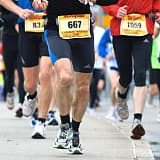Dmitry Mironov
Instagram: @dmitry.mironovv

Instagram: @dmitry.mironovv
Good afternoon!
How can I start running without walk breaks?

Master of Sports of International class in track and field athletics, winner of the Zurich marathon, participant of the Beijing 2008 Summer Olympics, multiple European Cup and Russian championships medalist, coach of the school “I Love Running”
Greetings!
First you should find the reasons why you have to use walk breaks. If I understand it right, it becomes difficult for you to continue running at a certain moment of your training and you switch to walking. If I’m right, transition to walking is reasonable absolutely. It is a good way to reduce heart rate and catch your breath (without short of breath you might feel at that moment).
Thus, in order to improve your functionality you should train according to run/walk approach. During running your heart rate should be up to 160 beats per minute but not higher, then you should switch to walk reducing your heart rate till 135-140 beats per minute. Then, you can return to running again. Following this rule properly you can limit your walk breaks and soon, completely eliminate them from your running.
One important moment: a heart rate monitor is required.

A month ago I usually ran 10-15 km during trainings at average pace (5:10) with average heart rate (145 bpm).
Then I had two weeks break.
I returned to trainings and now I can maintain previous average pace with heart rate of 154 bpm.
How could it be that I lost my fitness shape or running technique so fast? I can't understand my body.

Suppose it is very popular question you hear from a beginner.
I have time to run both in the morning and in the evening (I have flexible hours and I like to sleep). I can't run early in the morning because I feel like my body is still sleeping. If I run at my average pace, heart rate during running will be 165 beats per minute in the morning and 150-155 in the evening. So, I can conclude that my body is warmed up enough in the evening and "sleeps" in the morning. Is it true?
Thanks for your reply.

Good day.
I'm 55 and I've been running for a long time, my usual distance is 10-15 km and 21 sometimes. My average pace is 6:15 min/km. I do interval running sometimes as well.
Now, I want to run my first marathon. Is it enough to run 10-15 km every other day at a slow pace without ambition (I can talk during running) or is it advisable to move on?
Thank you.

What period, in your opinion, is required for physiological adaptation to low heart rate training loads (slow running for building an adequate aerobic base) and whether or not faster sessions, strength exercises, bodyweight moves or gym exercises (physical fitness/ running-specific exercises) should be included during this period? Beginners and/or runners after a break/sickness can be used as an example.
Thank you!
